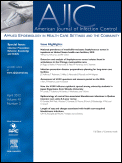
AMERICAN JOURNAL OF INFECTION CONTROL
Scope & Guideline
Shaping policies, enhancing safety, controlling infections.
Introduction
Aims and Scopes
- Infection Prevention Strategies:
Research focusing on effective strategies for preventing infections in healthcare settings, including hand hygiene, personal protective equipment (PPE) usage, and disinfection protocols. - Epidemiology of Healthcare-Associated Infections:
Studies investigating the prevalence, risk factors, and outcomes associated with healthcare-associated infections (HAIs), including antibiotic-resistant infections. - Surveillance and Data Analysis:
Research utilizing surveillance data to identify trends in infection rates, effectiveness of infection control measures, and the impact of various interventions on patient outcomes. - Antimicrobial Stewardship:
Papers exploring approaches to optimize antibiotic prescribing practices and reduce antimicrobial resistance through effective stewardship programs. - Impact of Emerging Infectious Diseases:
Research addressing the implications of emerging infectious diseases, including COVID-19, on infection control practices and healthcare systems. - Health Policy and Education:
Studies focusing on the development of guidelines, training programs, and policies to enhance infection control practices among healthcare professionals.
Trending and Emerging
- COVID-19 Related Research:
A significant increase in publications focused on COVID-19, including its impact on infection control practices, vaccination strategies, and management of healthcare-associated infections during the pandemic. - Technological Innovations in Infection Control:
Emerging interest in the application of technology, such as automated hand hygiene monitoring systems and UV-C disinfection technologies, to enhance infection prevention efforts. - Antimicrobial Resistance and Stewardship:
Growing emphasis on research related to antimicrobial resistance, including studies on stewardship interventions and the epidemiology of resistant organisms in healthcare settings. - Mental Health and Well-being of Healthcare Workers:
Increased focus on the mental health impacts of infection prevention roles, particularly during the COVID-19 pandemic, highlighting the need for supportive work environments. - Patient and Family Engagement in Infection Control:
Emerging research on involving patients and families in infection prevention practices, recognizing their role in enhancing compliance and outcomes.
Declining or Waning
- Traditional Infection Control Measures:
There has been a noticeable decline in studies focusing solely on traditional infection control measures, such as basic hand hygiene protocols, as more attention shifts towards innovative and technology-driven approaches. - Specific Pathogen-Related Studies:
Research centered on specific pathogens, particularly those that were previously prominent (e.g., MRSA), has waned as broader themes of antimicrobial resistance and infection prevention strategies take precedence. - Longitudinal Studies on Established Infections:
Long-term studies focusing on established infections (e.g., surgical site infections) are less frequent, with a shift towards acute and emerging infection scenarios, especially those related to COVID-19.
Similar Journals
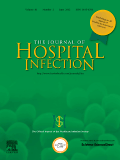
Journal of Hospital Infection
Setting the Benchmark for Infection Control ExcellenceJournal of Hospital Infection, published by W B SAUNDERS CO LTD, stands as a pivotal resource in the infectious diseases, medicine, and microbiology sectors. With an impressive impact factor positioning it in the Q1 quartile across its relevant categories, this journal not only ranks highly—#32 out of 344 in Infectious Diseases and #17 out of 140 in Medical Microbiology—but also exemplifies a commitment to advancing knowledge and practice in hospital infection control. Since its inception in 1980, the journal has become a vital platform for disseminating research that informs clinical practices, promotes safety in health care environments, and enhances medical education. While access is non-open, the journal's extensive scope and rigorously peer-reviewed contributions ensure its relevance and significance to researchers, professionals, and students aiming to stay at the forefront of this dynamic field. The journal’s headquarters in London underscores its international relevance, making it an essential reference for anyone involved in combating hospital-acquired infections.
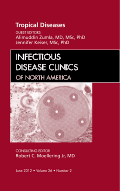
INFECTIOUS DISEASE CLINICS OF NORTH AMERICA
Catalyzing Change in Infectious Disease UnderstandingINFECTIOUS DISEASE CLINICS OF NORTH AMERICA, published by W B SAUNDERS CO-ELSEVIER INC, stands as a premier academic resource in the field of infectious diseases and microbiology. With its ISSN 0891-5520 and E-ISSN 1557-9824, this esteemed journal has been at the forefront of disseminating critical research findings and clinical advancements since its inception in 1987. Known for its high impact, the journal ranks in the Q1 category for both Infectious Diseases and Medical Microbiology as of 2023, which underscores its significant contribution to advancing knowledge and practice in these vital areas. Researchers, practitioners, and students alike rely on its comprehensive yet concise reviews and original articles, ensuring they stay abreast of emerging trends and therapeutics in infectious disease management. Although it does not offer open access, the journal remains pivotal in enriching scholarly dialogue and influencing clinical practices in the United States and beyond. Explore this vital publication and join a community dedicated to excellence in infectious disease research.

Infection Prevention in Practice
Empowering practitioners with cutting-edge infection control research.Infection Prevention in Practice is a leading academic journal published by ELSEVIER that has established itself as a vital resource in the domains of Infectious Diseases and Public Health. With its Open Access policy implemented since 2019, the journal enhances global accessibility to cutting-edge research and practical insights aiming to reduce the risk of infections in various settings. It proudly holds a Q3 ranking in Infectious Diseases and a Q2 ranking in Public Health, Environmental and Occupational Health as of 2023, showcasing its impact and relevance within the scientific community—particularly with a Scopus rank placing it in the 71st percentile for public health research. Its scope includes the latest advancements, strategies, and practices in infection prevention, making it an indispensable read for researchers, healthcare professionals, and students dedicated to improving health outcomes and combating infectious diseases effectively. The journal operates from its base in the United Kingdom and reaches a global audience, fostering collaboration and innovation in infection control practices.

Annals of Clinical Microbiology and Antimicrobials
Uniting global voices in the battle against infections.Annals of Clinical Microbiology and Antimicrobials, published by BMC, is a leading open-access journal that has been fostering scientific discourse in the fields of microbiology and infectious diseases since its inception in 2002. With an established reputation for excellence, this journal is positioned in the prestigious Q1 category across multiple disciplines, including Infectious Diseases, Medicine (miscellaneous), and Medical Microbiology as of 2023. This journal serves as a vital platform for researchers, healthcare professionals, and students, promoting the latest advancements in clinical microbiology and antimicrobial research. Access to its invaluable content is open to all, reflecting the commitment to disseminate knowledge universally. The Annals of Clinical Microbiology and Antimicrobials is based in the United Kingdom and continues to pave the way for innovation and discussions that shape the future of clinical practices in microbiology.

Infectious Disease Reports
Leading the charge in infectious disease research and collaboration.Infectious Disease Reports is a premier open-access journal published by MDPI, dedicated to advancing the field of infectious diseases. Since its inception in 2009, this journal has established itself as a significant platform for disseminating cutting-edge research, reviews, and case studies, critical for global health. With a commendable Q2 ranking in the category of Infectious Diseases and a Scopus rank of #140 out of 344, it is recognized for its impactful contributions to medical research, holding a 59th percentile in its field. The journal aims to provide comprehensive insights into various dimensions of infectious diseases, ranging from epidemiology to novel treatment modalities. As an open-access publication, Infectious Disease Reports ensures that its articles are freely available to a wide audience, fostering collaborative efforts among researchers, healthcare professionals, and students worldwide. With its ongoing commitment to excellence, the journal plays an essential role in shaping the future of infectious disease research.

New Microbes and New Infections
Pioneering research on emerging microbes and infections.New Microbes and New Infections is an esteemed peer-reviewed journal published by Elsevier Sci Ltd that has been a prominent platform for disseminating groundbreaking research in the fields of Infectious Diseases and Microbiology since its establishment in 2013. With an impressive Open Access model, this journal ensures that vital research findings are readily accessible to researchers, healthcare professionals, and academics worldwide. Positioned in the Q2 category for Infectious Diseases and Q3 for Microbiology in 2023, it reaches a significant global audience, as demonstrated by its high Scopus rankings—#44 out of 344 in Medicine: Infectious Diseases, and #34 out of 182 in Immunology and Microbiology. The journal aims to inspire new ideas and foster collaborations by publishing high-quality research focused on novel microbes and infections, thus playing a crucial role in advancing science and public health in an era where understanding infectious agents is more vital than ever.

GMS Hygiene and Infection Control
Championing best practices in infection control.GMS Hygiene and Infection Control is a leading open access journal dedicated to advancing knowledge and research in the fields of hygiene, infection control, and public health. Published by GERMAN MEDICAL SCIENCE-GMS, this journal has been offering unrestricted access to its rich repository of scholarly articles since 2013, making significant contributions to the global discourse on infection prevention and control strategies. With its commitment to promoting high-quality research, GMS Hygiene and Infection Control is a vital resource for researchers, healthcare professionals, and students engaged in the pursuit of best practices for improving health outcomes. The journal is built upon a foundation of rigorous peer review and aims to disseminate innovative findings that address current challenges in hygiene and infection control, thereby enhancing clinical practices and public health policies worldwide.

Current Infectious Disease Reports
Connecting Scholars to the Pulse of Infectious Disease TrendsCurrent Infectious Disease Reports, published by SPRINGER, is a leading journal dedicated to advancing knowledge in the field of infectious diseases. With an ISSN of 1523-3847 and an E-ISSN of 1534-3146, this peer-reviewed journal has established itself as a vital resource for researchers and healthcare professionals since its inception in 1999. The journal's impact in the academic community is underscored by its Q1 ranking in Infectious Diseases for 2023, placing it in the top quartile of influential journals in the field. Furthermore, it holds a respectable position at rank #95 out of 344 in the Scopus database, reflecting its substantial contribution to medicine and public health. While currently not an open access journal, it offers a wealth of articles covering the latest research, case studies, and reviews, making it an indispensable tool for those aiming to stay at the forefront of infectious disease science. As we navigate an era marked by emerging and re-emerging infectious threats, Current Infectious Disease Reports remains committed to providing high-quality, relevant research that supports evidence-based practice and informs future studies globally.
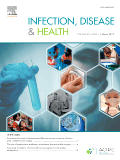
Infection Disease & Health
Bridging Research and Practice in Infection Disease & HealthInfection Disease & Health, published by Elsevier Inc, serves as a premier interdisciplinary journal dedicated to advancing the fields of infectious diseases, public health, and nursing. With an impressive impact factor reflective of its rigorous scholarly contributions, the journal is currently indexed within the Q2 category in Infectious Diseases and Q1 in Nursing (miscellaneous) as of 2023, indicating its esteemed position in these areas. Launched in 2016, it has rapidly established itself as a valuable resource for researchers, clinicians, and students alike, emphasizing both original research and comprehensive reviews that address pressing health challenges. Authors and readers are encouraged to engage with a wealth of content that is meticulously curated to inform and inspire innovative practices within the health sector. While the journal is not an open-access platform, it offers various access options to enhance dissemination of knowledge. As the field of infectious diseases evolves, Infection Disease & Health remains at the forefront, fostering scholarly dialogue and contributing to the development of effective health strategies globally.
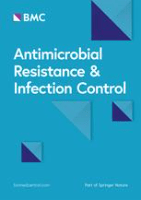
Antimicrobial Resistance and Infection Control
Leading the charge in antimicrobial resistance research.Antimicrobial Resistance and Infection Control is a leading open access journal published by BMC, dedicated to the dissemination of research in the critical area of antimicrobial resistance and its impact on infection control practices. Since its inception in 2012, the journal has quickly established itself as a vital resource for researchers, healthcare professionals, and policymakers, featuring a robust array of studies that address the escalating threats posed by antimicrobial resistance across various contexts. With its impressive Q1 rankings across multiple categories—including Infectious Diseases, Microbiology, Pharmacology, and Public Health—the journal’s influence is underscored by its consistent placement in the upper echelons of academic research. Furthermore, it holds commendable ranks in Scopus, with percentiles placing it in the top tier of its respective fields. The journal serves as an essential platform for innovative research and discussions aimed at curbing the threats of antimicrobial resistance, thereby supporting the global health community in striving for effective solutions to safeguard public health.